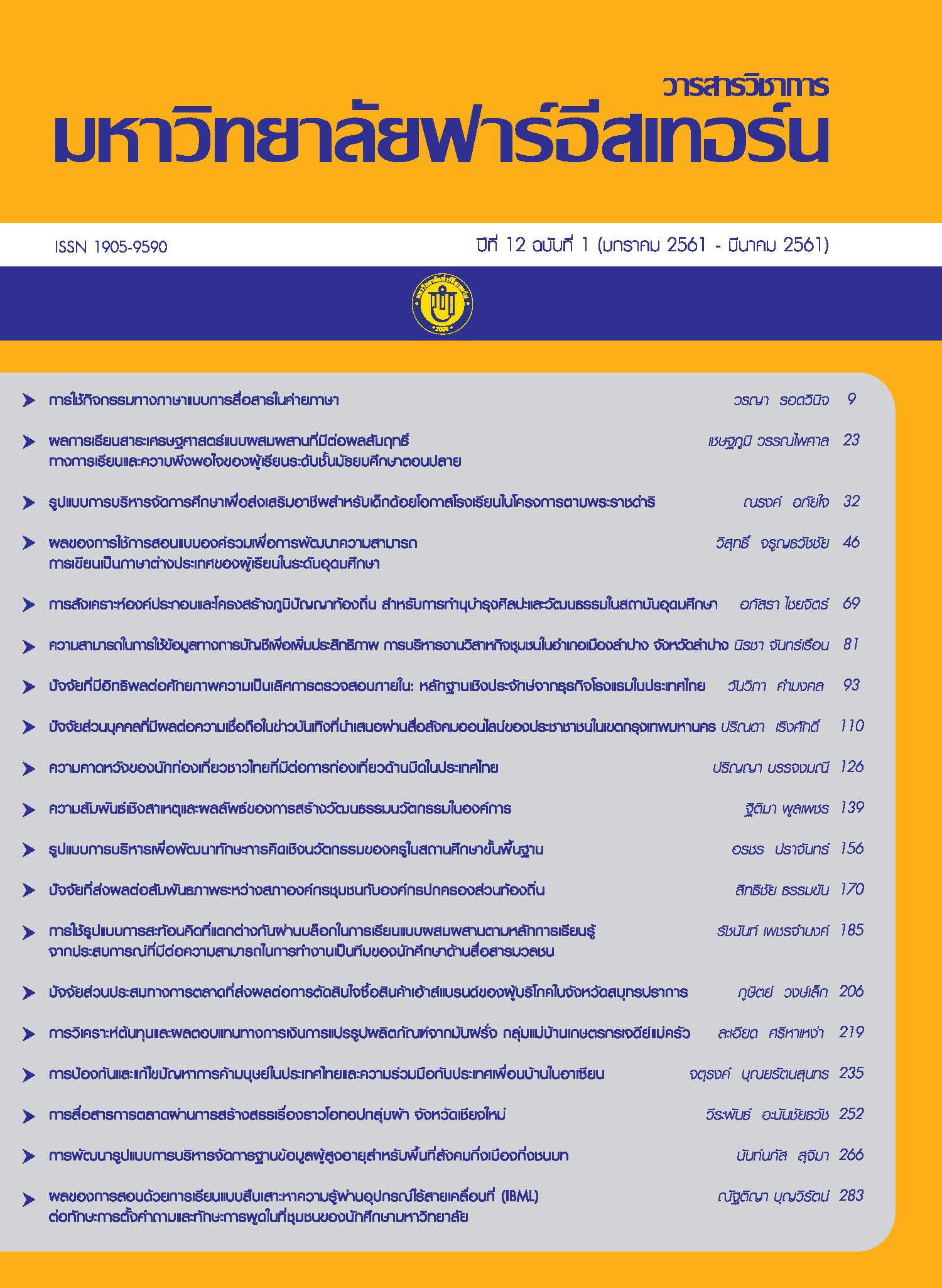Effects of Inquiry-Based Mobile Learning (IBML) on University Students’ Questioning and Public Speaking Skills
Main Article Content
Abstract
The purposes of this study were 1) to develop an instructional activity based on the integration of inquiry-based learning approach, and mobile learning approach for enhancing questioning skills and public speaking skills among undergraduate students; and 2) to evaluate the effectiveness of the developed instructional activity. The research procedure was divided into two phases: 1) The develop in of an instructional activity and 2) The effectiveness evaluating of the developed instructional activity which was implemented with 30 undergraduate students in the Faculty of Arts of a private university at Chiang Mai, Thailand who were considered as the subjects of this study.The duration of the experiment was one semester.The data were collected through questions in KWH chart and public speaking assessment along with their scoring criteria.The data were analyzed using dependent t-test, and one way repeated measure of ANOVA. The findings of the study were as follows:
1. The developed instructional activity consisted of 3 teaching stages: 1) stimulating curiosity and questioning 2) investigation and peer experiences and 3) communication and reflections.
2. After the implementation, it was found that the average score of the questioning skills (M = 3.63, SD = .51) and public speaking skills (M = 10.73, SD = 1.91) in the post-experiment of the subjects was significantly higher than that in pre-experiment (M = 2.58, SD= .43 and M = 8.76, SD = 1.72) at 0.5 level. In addition, the results of one-way ANOVA with repeated measures of questioning and public speaking skills also showed the overall scores of both skills were higher after learning through IBML activity in each learning unit.
การวิจัยนี้มีวัตถุประสงค์เพื่อ 1) พัฒนากิจกรรมการเรียนการสอนโดยใช้วิธีการเรียนแบบสืบเสาะหาความรู้และการเรียนผ่านอุปกรณ์ไร้สายเคลื่อนที่เพื่อเสริมสร้างทักษะการตั้งคำถามและทักษะการพูดในที่ชุมชนของนักศึกษาระดับปริญญาตรี และ 2) เพื่อประเมินประสิทธิผลของกิจกรรมการเรียนการสอนที่พัฒนาขึ้น ขั้นตอนการวิจัยแบ่งเป็น 2 ขั้นตอนคือ 1) การพัฒนากิจกรรมการเรียนการสอน 2) การประเมินประสิทธิผลของกิจกรรมการเรียนการสอนที่พัฒนาขึ้นโดยใช้นักศึกษาปริญญาตรีจำนวน 30 คนจากคณะศิลปศาสตร์มหาวิทยาลัยเอกชนแห่งหนึ่งใน จังหวัดเชียงใหม่ เป็นกลุ่มตัวอย่างของการศึกษาครั้งนี้ ระยะเวลาของการทดลอง คือ 1 ภาคเรียน ข้อมูลรวบรวมจากคำถามในตาราง KWH และการประเมินผลการพูดในที่ชุมชนพร้อมด้วยเกณฑ์การให้คะแนนของทั้งสองทักษะ วิเคราะห์ข้อมูลโดยใช้สถิติทดสอบค่าทีและการวิเคราะห์ความแปรปรวนทางเดียวแบบวัดซ้ำผลการวิจัยพบว่า
- รูปแบบการเรียนการสอนที่พัฒนาขึ้นเพื่อเพิ่มพูนทักษะการตั้งคำถามของนักศึกษาและทักษะการพูดในที่ชุมชนประกอบด้วย 3 ขั้นตอนคือ 1) ขั้นกระตุ้นความอยากรู้และตั้งคำถาม 2) ขั้นสืบค้นและเรียนรู้จากประสบการณ์ผู้อื่นและ 3) ขั้นสื่อสารและการสะท้อนคิด
- หลังการทดลองพบว่าคะแนนเฉลี่ยของทักษะการตั้งคำถาม (M = 3.63, SD = .51) และทักษะการพูดในที่ชุมชน (M = 10.73, SD = 1.91) หลังทดลองสูงกว่าก่อนการทดลอง (M = 2.58, SD = .43 และM = 8.76, SD = 1.72) อย่างมีนัยสำคัญทางสถิติที่ระดับ.05นอกจากนี้ผลการวิเคราะห์ความแปรปรวนทางเดียวแบบวัดซ้ำในทักษะการตั้งคำถามและการพูดในที่ชุมชนยังแสดงให้เห็นว่า ผลคะแนนทักษะทั้งสองมีค่าสูงขึ้นหลังจากเรียนรู้ผ่านกิจกรรม IBML ในแต่ละหน่วยการเรียนรู้
Article Details
1. Any views and comments in the Journal of Social Innovation and Lifelong Learning are the authors’ views. The editorial staff have not to agree with those views and it is not considered as the editorial’s responsibility.
2. The responsibility of content and draft check of each article belongs to each author. In case, there is any lawsuit about copyright infringement. It is considered as the authors’ sole responsibility.
3. The article copyright belonging to the authors and The Far Eastern University are copyrighted legally. Republication must be received direct permission from the authors and The Far Eastern University in written form.
References
Amineh, R. J., & Asl, H. D. (2015, April 30). Review of Constructivism and Social Constructivism. Journal of Social Sciences, Literature and Languages, 1, 9-16. Retrieved from https://goo.gl/qTBVfx
Bruner, J. S. (1966). Toward a theory of instruction. Cambridge, MA: Belknap Press of Harvard University.
Bunwirat, N. (2017). English Language Teaching in AEC Era: A Case Study of Universities in the
Upper Northern Region of Thailand. FEU Academic Review, 11(2).
Constructivism as a Paradigm for Teaching and Learning. (2004). Retrieved from https://goo.gl/r5qxCM
David, L. (2015). Constructivism Learning Theory. Retrieved January 10, 2018, from https://www.learning-theories.com/discovery-learning-bruner.html
Dunbar, N. E., Brooks, C. F., & Kubicka-Miller, T. (2006). Oral communication skills in
higher education: Using a performance-based evaluation rubric to assess
communication skills. Innovative Higher Education, 31(2), 115-128.
Foley, J. (2012). Unscrambling the Omelets. Second Language Acquisition: Social and Psychological Dimensions. Assumption University Press.
Jindathai, S. (2015). Factors Affecting English Speaking Problems among Engineering Students at Thai-Nichi Institute of Technology. Retrieved September 23, 2016, from https://goo.gl/W5spvF
Koole, M. (2011). Mobile Learning: Is the FRAME Model still current? Retrieved April 24, 2016, from https://kooleady.ca/thoughts/?p=619
McLeod, S. (2012). Bruner. Retrieved September 30, 2016, from https://goo.gl/UB3Wjd Miangah, T. M., & Nezarat, A. (2012). Mobile-assisted language learning. International Journal of Distributed and Parallel Systems, 3(1), 309.
Pedaste, M., Mäeots, M., Leijen, Ä., & Sarapuu, T. (2012). Improving Students' Inquiry Skills through Reflection and Self-Regulation Scaffolds. Technology, Instruction, Cognition & Learning, 9. 81-95.
Pedaste, M., Mäeots, M., Siiman, L. A., Jong, T. D., Riesen, S. A., Kamp, E. T., . . .Tsourlidaki, E. (2015). Phases of inquiry-based learning: Definitions and the inquiry cycle. Educational Research Review, 14, 47-61. doi:10.1016/j.edurev.2015.02.003
Plangkham, B., & Porkaew, K. (2012). Anxiety in English Public Speaking Classes. LEARN
Journal: Language Education and Acquisition Research Network, 5, 110-119.
Rooney, C. (2012). How am I using inquiry-based learning to improve my practice and to encourage higher order thinking among my students of mathematics?. Educational Journal of Living Theories, 5(2), 99-127.
Sharples, M. (2000). The design of personal mobile technologies for lifelong learning. Computers & Education, 34(3), 177-193.
Saxena, S. (2013, December 5). Use of Mobile Technology for Inquiry-Based Learning. Retrieved May 02, 2016, from https://goo.gl/hh4XUj
Seol, S., Sharp, A., & Kim, P. (2011, July). Stanford Mobile Inquiry-based Learning Environment (SMILE): using mobile phones to promote student inquires in the elementary classroom. In Proceedings of the 2011 International conference on frontiers in education: Computer science & computer engineering. (pp. 270-276).
Sundrarajun, C. (2007). From interaction to presentation: oral English skills development in the Thai university context. Doctor of Education, School of Education University of Bristol.
Tanaka, M., & Sanchez, E. (2016). Students' Perceptions of Reading through Peer Questioning in Cooperative. TESL-EJ, 19(4), n4.
Ur, P. (2012). A course in English language teaching. Cambridge: Cambridge University Press. Yoon, H., Joung, Y., & Kim, M. (2012). The Challenges of Science Inquiry Teaching for Pre- Service Teachers in Elementary Classrooms: Difficulties on and under the Scene. Research in Science Education, 589-608.
Yunus, M. (2010). Improving Students’ Speaking Skill through Guided Questions with Inside Outside Circle Technique at the First Grade of SMA Wahid Hasyim Malang (Action research project, Islamic University of Malang). Retrieved from https://goo.gl/mDp2mo

